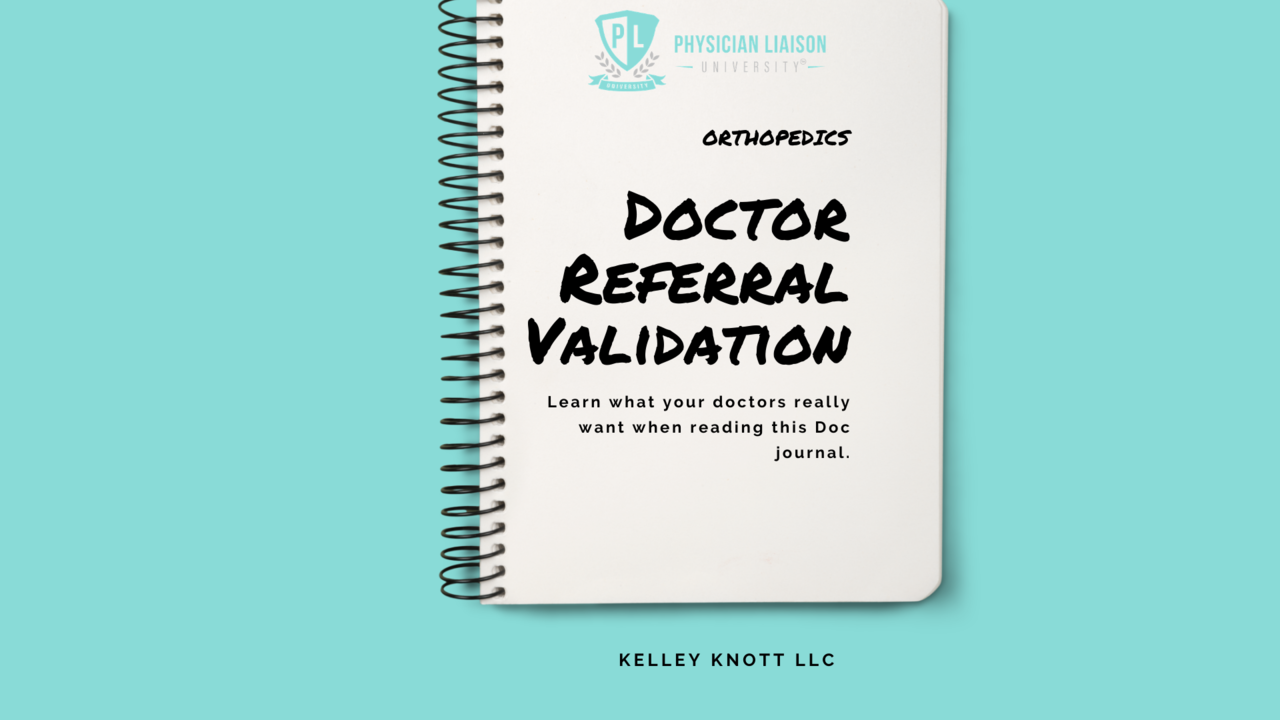Orthopedics

We conducted validation interviews with doctors to find out their feedback and thoughts regarding Physician Liaisons. They provided insightful responses that will surely help better our services and what we can do for their practices.
Here are the questions that were asked:
1. What are the top specialties you refer out to most (ortho, OBGYN, Pain, ENT, etc), and for what (conditions/symptoms/treatment)?
2. Besides excellent patient care, when referring to a physician, what factors help you make that decision to send to that physician or practice? (examples: cell phone number, them meeting, you face to face, location, etc)
3. Is there something a physician liaison or medical rep that stands out to you in a positive or negative way, and why?
4. If a physician liaison comes to your practice to discuss building a patient-referring relationship between you and their specialists, what can they say/ do that would provide value for you or your staff?
5. What is the greatest value a physician liaison would be able to provide to your practice?
Audio Interviews:
Let's hear from Dr. Cory her feedback and thoughts
Written Validation Interview:
Dr. Tamara H.
1. Pain management for non-op treatment
2. Patient feedback and personal connection with the physician or practice.
3. Relevant feedback - ex: what is the consulting physician’s specialties and training? Facilitating communication b/w providers.
4. See #3
5. Being a facilitator of communication between practices.
Dr. Vikram C.
1. I refer out mainly for Spine and Pain services. I perform a lot of hip placement surgeries. As a result of this, I also end up with a lot of patients who have spine-related issues especially lower back pain which can mimic hip pain. Some of them need surgeries while others have chronic pain issues. These are the ones I refer out after ruling out or ruling in any hip problems which I handle myself
2. The most important factor for us is patient feedback, reputation in the community. I pay close attention to the overall patient experience when they are sent to a different specialist. Things like timeliness of appointment, communication from the other specialist are also very important
3. I am an orthopedic surgeon and I work with a lot of medical representatives who sell orthopedic implants. The quality of service they provide is extremely important. This includes knowledge about their own products, keeping a track of inventory, training opportunities, and support for my staff. They are expected to show up half an hour to an hour before the surgical procedure and make sure everything is in order. These are the qualities we look for
4. The physician liaison can make sure that there is appropriate referrals back-and-forth. Patients get timely appointments. Their medical information is transferred in a seamless manner.
At the same time, we would expect them to promote the brand value of the practice and also market the practice
5. They could help us become more efficient by eliminating roadblocks for both the patient and the physicians. This would usually include working with other offices where we have patients back-and-forth. In addition to that, it would involve working with insurance, social work, home health, physical therapy, and occupational therapy
Dr. Harry S.
1. Neurosurgery for evaluation regarding intra-medullary pathology, interventional radiology for diagnostic procedures, primary care for surgical clearance
2. Excellent communication, cell phone availability,
3. Physician: poor patient or parent opinion, poor communication. Rep: not having all the necessary equipment
4. Provide a one person contact in their practice
5. Taking care of the problem for which the patient was referred to.
Dr. Kay K.
1. Rheumatology (RA, etc), neurology (tremor, etc), other orthopedics sub-specialties (other orthopedics problems other than my specialty of hand surgery), physiatry (nerve studies, epidural steroid injections).
2. Access, responsiveness.
3. Respect for practice rules, courtesy. Providing information, not selling.
4 & 5. Information about the practice and how to reach them directly (direct referral or cell #, etc)
Dr. Peter A.
1. Pain management
2. The patient is satisfied with the care they received and I can communicate with the provider via cell phone if needed
3. (No Answer)
4. Be the contact person with any questions the Doctors May have. Facilitate transfer of medical information.
5. Improve referrals to my practice
Dr. Jeffrey M.
1. Pain or GP
2. Good outcomes and responsiveness
3. Appropriate boundaries
4. They need to have the other physician reach out after. Simply provide good solid resources.
5. Ones that provide quality care and that are responsive
Dr. Christian G.
1. Ortho; complex musculoskeletal treatment failures
2. Capability 1st. Ease of communication 2nd.
3. Positive. It’s the only way to properly navigate complex terrain.
4. Assure us that our patient will get the proper care AND that we will be given follow-up
5. It removes us from the process while leaving us assured that the job will get done.
Dr. Christopher B.
1. The specialties I mostly refer to as a Neurosurgeon are Pain Management, PM&R (Rehab), Orthopedics, and Physical Therapy. Usually, the referrals are placed after I make a particular diagnosis and we either have to assign a "conservative" treatment to them as part of their management, or rarely to another specialty for them to make a diagnosis. Some referrals that are placed are to establish a cooperative care system (ie. when another surgeon is required to do the surgery). Pain Management is necessary for non-surgical treatments of spinal disorders.
2. The factors I consider most when referring a patient to a physician or practice is my personal relationship with them. I like to meet them and discuss our practices and get an idea as to who they are and how they practice. if that is not possible, then their reputation is the next most important thing for me. Because we cover such a large area of New Jersey, patient convenience is also a factor.
3. A physician liaison is most helpful when they can help me delineate who would or could refer to my practice, and whether those cases end up being surgical or not. They are also most helpful in establishing contacts with other possible referring physicians, or other groups who are looking to expand their referral networks.
4. Having an already working knowledge of the referral sources to and from my practice would establish to me that the liaison can be most helpful quickly. That would be the most important.
5. The greatest value for me would be the ability to establish referrals and continue to work with me over time to expand areas of the practice based on my and the community's needs
Dr. Philip L.
1. PM&R, physiatry, pain management for non-operative spine-related conditions
2. A built working relationship, word of mouth from other providers, having met them in person, location
3. Help with introductions to other providers that fall within my heavy referral patterns; help develop our personal profile and marketability for incoming referrals; networking opportunities
4. Take the time to learn about the provider and tailor their recommendations and plans based on the provider's personality, medical center restrictions, etc... Be patient with our limited knowledge and obstacles that we face in growing our practice and marketing ourselves. Respect the fact that many of us our reserved for self-promotion and trying to balance that feeling and marketing our practice.
5. Ultimately, and in a very blunt manner --- How can we ultimately attract more patients with commercial insurance? How can we reach out and continue to educate the community (patients) and other primary care providers (referral source)?
Dr. Blake M.
1. I am an orthopedic subspecialist in trauma, so my referrals are limited to other orthopedic subspecialties mostly. I refer patients to hand, sports, and foot and ankle most. If I am referring out of subspecialty, usually general surgery, neurosurgery, or psychiatry.
2. The factors I use for referral are based on skill first, then location, and bedside manner. If I have a patient that requires extra social attention or someone that wants just a technician, I take that into account.
3. A physician liaison or rep must be able to develop trusting relationships in an unbiased way with the practices and physicians they work with. They should also understand the specific services rendered by each physician that they liaise with so they can communicate these services to all the practices they work with for most efficient referral process.
4. I appreciate honesty and integrity. Developing a relationship with a physician liaison takes time and difficult to do in one meeting. I think when they come to the office, they should provide a list of groups they work with and how they feel that they can help your practice grow. A lot of physicians don't want to be bothered by many reps, but asking "how can we make you successful?" or "how can we help to provide efficient care to your patients?" would be a good place for me to start. If you have someone that takes these questions seriously, you should develop a good community of physicians to work with.
5. Providing a strong, trusting relationship with different groups in the community. I think a physician liaison can help make all practices better for patient care as well as more profitable if done well.
Dr. Henaku Y.
1. Being a specialist myself, I actually refer to pain management and primary care the most
2. Great question, personal relationships go a long way in making that decision. Patient care and safety is primary but definitely more likely to refer to someone I have met in person
3. The most positive indicator is knowledge of their product and its benefit to patients. This lays the foundation of trust in the person and product.
4. The most important factor there is the quality of the care at that physician's office. Demonstrating care quality and patient satisfaction will be helpful to me and the office staff
5. The greatest value will be ensuring physician maintains a great continued relationship with other physicians, patients, and the local community
Dr. Ronald G.
1. I typically refer to Family Medicine Sports Medicine doctors for non-operative knee and hip pain.
2. As a military provider, I have no control over referrals outside the military treatment facility. I refer based on the availability of treatment modalities such as image-guided injections.
3. I do not appreciate Reps that try to push their company’s products without having any significant research data to support the results that are being claimed.
4. They can arrange for a presentation and demonstration of their products. Having patient testimonials (positive and negative).
5. A liaison could offer assistance with providing specific information on what treatments are offered at the various outside referral networks
Dr. Chris H.
1. I am an ortho. I refer to pain mgmt & spine surgeons but that’s about it
2. Communication back about what they did for the patient
3. Just good communication and results
4. Outcomes data and what the patient experience will be like
5. I could use one for myself to help gain referrals since I’m a specialist

